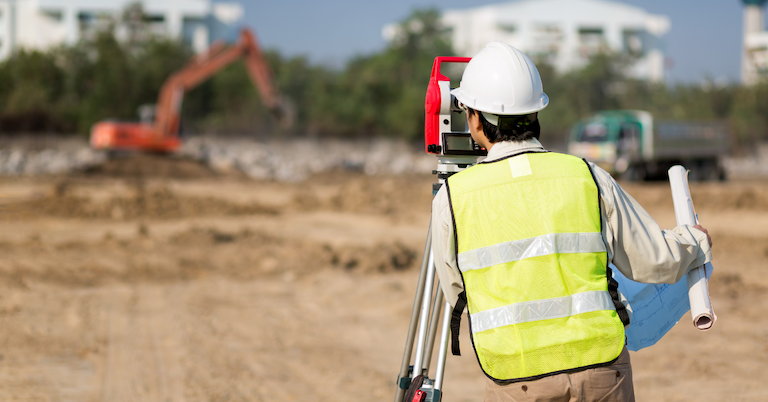As a buyer or seller, you are probably familiar with services like inspections and appraisals that are typically required in a real estate transaction. While these two assessments are key, there is another that you might also want to consider. That assessment is a land survey.
You may be wondering “what is a land survey and why is it important?”. Land surveys help to define property lines. However, they don’t stop there. Whether you are looking to buy, sell, or refinance a property, it is a good idea to get a land survey in order so you can understand where property boundaries exist. Knowing this information can help you make informed decisions with your property and help you handle potential property disputes.
What is a Land Survey?
In the simplest terms, a land survey is a drawing (similar to a map) that outlines the legal boundaries of a property. In addition to the property, a land survey will also lay out the dimensions for other features such as buildings or land improvements.
The information provided within a land survey can be valuable tools used to clarify any disputes or resolve any issues that might arise during a real estate transaction.
When Would You Need a Land Survey?
While land surveys are not typically required in real estate transactions, they are a very useful tool that can help clear up confusion. Land surveys allow us to understand where one piece of land ends and another begins. There are several situations in which knowing this information is important to know. Here are a few of the most common:
- To resolve boundary disputes: One of the most common reasons people get land surveys is to handle disputes over property lines. For example, imagine your neighbor put up a fence that appears to be on your property. If you and your neighbors can’t agree as to whether it is over the property line, you can hire a land surveyor to figure out the property boundaries and settle the dispute.
- Pinpoint land size and negotiate price: If you are purchasing a plot of land, having a land survey can be a wonderful negotiating tool. Land surveys are used to accurately determine the size of a plot of land that is being sold. If the plot of land is smaller than what is advertised, you can easily talk down costs with a land survey.
- To build a new home: In most states, a land survey is a standard requirement for building a new home. Certain land surveys show elevation points which are crucial in helping architects determine the best place to build a structure on an area of land, as well as the overall design of the structure and its drainage systems.
What Are the Types of Land Surveys?
When it comes to land surveys, there are several options. The types of survey you choose to get will depend on the reason you need a land survey. Let’s take a look at some of the most common land survey types you are likely to come across.
- ALTA survey: ALTA (American Land Title Association) is the survey type you would use if you are buying a new home or investment property. This type of survey is one of the more detailed survey types. It is often required in order to receive title insurance, and often required by lenders prior to them providing you financing.
- Boundary survey: Just as it sounds, boundary surveys are used to determine exact property lines. Surveyors may need to research the history of the property in terms of associated deeds and paperwork, in addition to performing the physical survey. This survey type is used for settling legal disputes over land, locating easements on a property, or simply to have for your own personal records.
- Location survey: A location survey is very similar to a boundary survey in that it determines property boundaries. However, location surveys also include drawing the boundaries for all additions or improvements made to a property. This survey type is most often used by property owners for zoning permits.
- Topographical survey: A topographical survey identifies and maps out the natural and man-made features on a property. This might include features like trees, fences, utilities, ponds, and elevations. Topographical surveys are often used by architects and engineers for site improvement purposes. If you are buying land to build a new home on, your architect will require this survey type.
How Much Does a Land Survey Cost?
The cost of a land survey varies depending on the size, location, terrain, and accessibility of the property being surveyed. Previous land survey records can reduce costs as the surveyor will have past documentation to review. The costs of land survey costs also includes the time the land surveyor spends evaluating the property on-site, researching property or geographic factors, and creating the report.
In general, most land surveys tend to cost between $200 and $800. Of course, land surveys will cost more for properties with more acreage and corners. There are also certain types of surveys that tend to be more expensive. For example, because ALTA surveys often require the surveyor to perform more extensive research on the property, you can expect a higher cost of between $2,000 and $3,000.
Who are Land Surveyors?
Land surveyors do more than walk around with giant sticks and tripods as you might have seen. These professionals use a combination of math, law, engineering, and physics to establish accurate property boundaries. Land surveyors use a variety of tools such as GPSs, software, radios, prisms, 3D scanners and much more to acquire their information. Once the information is gathered from these tools, it is compiled and put into a detailed report that is easy to understand.
Finding a credible land surveyor is essential to receiving the most accurate measurements. The last thing you want is to face unwanted consequences from faulty numbers. Be sure to do your research ahead of time and ask around for local reviews. Your realtor, architect, or title company may even have a land surveyor in mind that can help you out.
Whether it is a requirement or not, a land survey will provide you with peace of mind that your largest investment is accurately documented and protected. If any property issues arise or improvements are to be made, you can always refer back to your land survey to determine where those boundaries exist.
Looking to buy or sell soon? Contact our team at SimpleShowing. With a knowledgeable, well-connected real estate agent by your side, you should have no trouble finding the right professionals to assess your current or future property.
Conclusion
Land surveying is an essential aspect of property ownership that encompasses various types of surveys like topographic survey, mortgage survey, subdivision survey, construction survey, and as built survey. From precisely defining property boundaries and understanding past land survey records to ensuring compliance with building and zoning codes, professional land surveyors play an indispensable role. If you're a property owner, employing a licensed land surveyor ensures that you are abiding by legal requirements and will avoid potential legal disputes over property's boundary lines.
Investing in a land survey is an important step that provides property owners with peace of mind, clarity, and legal safeguarding. While land surveys cost may vary, the importance of employing a licensed land surveyor to carry out a meticulous examination of your property's boundaries, adherence to building and zoning codes, and creation of an accurate map that outlines every feature cannot be overstated. Whether you are buying, selling, or improving real estate, a thorough understanding of your property survey will equip you with the knowledge and confidence to make informed decisions.


